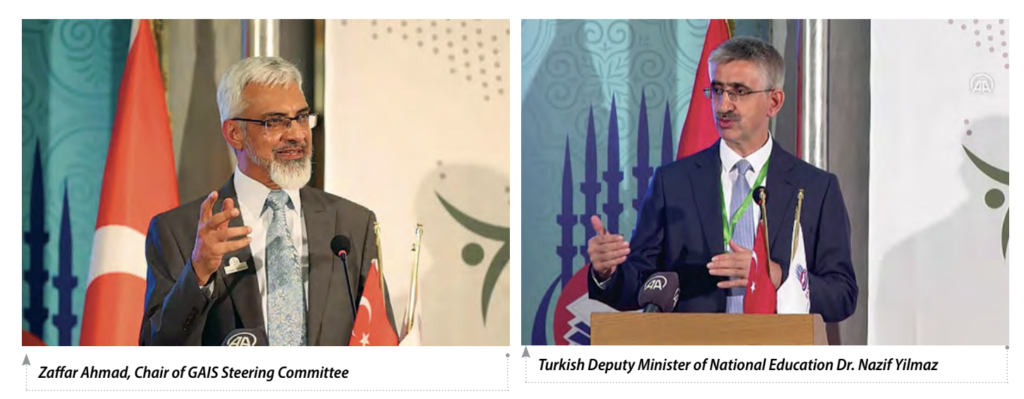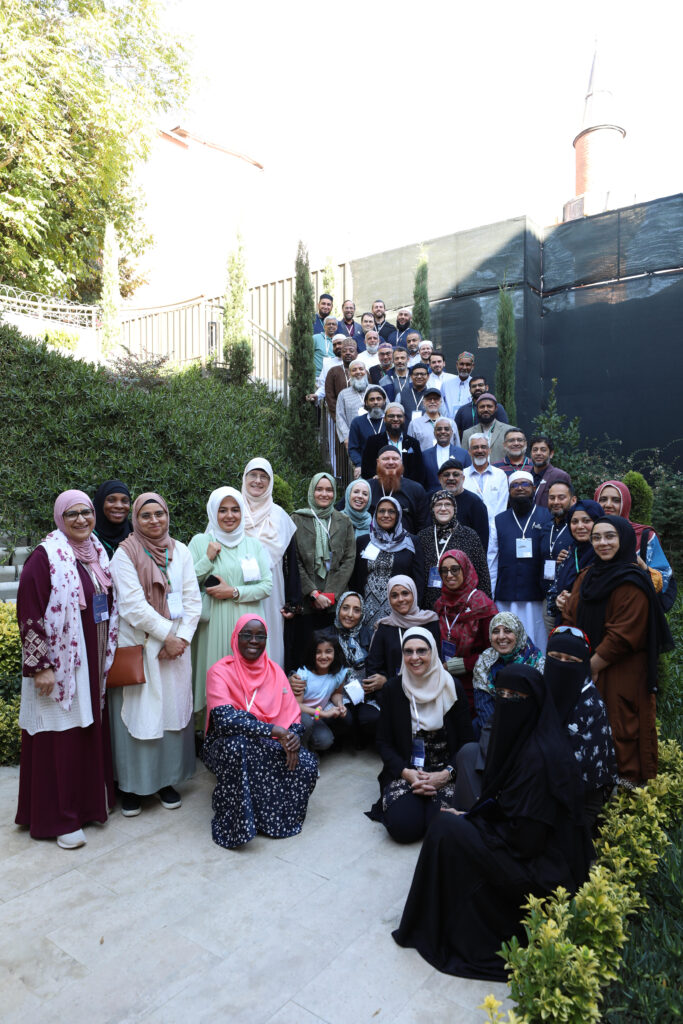The Global Association of Islamic Schools meets in Istanbul to map the future

By Silma Ihram
January/February 2023
As a former principal and founder involved in education since the 1980s, it has been a joy over the years to connect with other pioneers in the newly emerging field of Islamic education. Most of them, whether from post-colonial Muslim-majority countries or Western countries, have struggled independently with secularism’s pervasive existence in the public education sector as Western education became the essential requirement for professionals globally. Although facing similar challenges and difficulties, many of these individuals had little contact with each other — myself included.
One exception was the First World Conference on Muslim Education (Makka, 1977), which represented a rising awareness of the need for Islamic education and its related challenges. Luminaries of the time grappled with the global decline of holistic Islamic education: Naquib al Attas, the Malaysian philosopher who pioneered the Islamization of Knowledge concept; Syed Ali Ashraf (director-general, World Center for Islamic Education, Jeddah, d.1988), Ismail al-Faruqi (murdered in 1986), Abdullah Mohammed Zaid (member, editorial board, Islamiyat Almarifah) and others.
The 350 Muslim scholars who attended — more than practitioners — planted seeds of inspiration, identified key areas to address (e.g., religious vs secular education, perennial and acquired knowledge) and discussed how education could help meet the needs of the umma, society, Muslim minorities, as well as for educating women and youth.
As the development of Muslim schools gathered pace throughout the late 20th century, subsequent world conferences focused on specific areas of concern, such as resources, training and curriculum. However, many of these discussions didn’t filter down to those involved in establishing Muslim schools in the West, Africa and Muslim-majority countries. Nearly 50 years later, the key points raised in that first conference have yet to be resolved.
In 2022, now that Islamic education has become a prominent addition to many countries’ private schooling systems, the Global Association of Islamic Schools (GAIS) was established “to coordinate the work of emerging international Muslim schools.”
GAIS began in November 2021 as a small group of committed Muslim leaders in education who agreed to meet weekly online to discuss a possible global initiative. Within weeks a steering committee was established, along with a WhatsApp group that now includes 200+ international members. While its strategic vision is still being formulated, the organization has determined its overarching aim: to renew and transform Islamic education by providing thought leadership, networking opportunities and action-research focused on developing a holistic and relevant education for all students.
Much of the inspiration was drawn from and built on previous projects, such as the International Board of Research and Resources, formed to implement the 1977 conference’s aims and objectives in primary, elementary and secondary schools. However, its impact on the growing number of Islamic or Muslim schools globally was minimal.
After nearly a year of online meetings, GAIS held its first in-person retreat in Istanbul on Oct. 3-79, 2022. Over 80 delegates from 11 countries engaged in workshops, presentations and collaborative planning. The program was divided between strategic planning for GAIS and planning for the 2025 World Conference on Muslim Education. An extra day was allocated to visiting local schools.
One highlight was the gala dinner held in a former madrasa adjoining the historic Sultan Ahmed Mosque. Over a magnificent dinner and surrounded by ancient texts on well-used bookshelves, notable education leaders such as Ismail Tavman (president, Sultan Ahmet Mosque Waqf), Recep Şentürk (rector, Ibn Haldun University Istanbul), Nazif Yilmaz (deputy education minister), Mohamad Abdalla (founding director, The Centre for Islamic Thought and Education, The University of South Australia) and Yusuf Islam addressed the delegates. Zaffar Ahmed (principal, Al Falaah College, South Africa), who has driven much of GAIS’ organization, and Sheikh Abdul Mabud (director general, Islamic Academy in Cambridge, U.K), related the previous conferences’ history.

The concluding event of traditional art and music performances lifted everyone’s spirits with new hope, strengthened collegial bonds and built a shared sense of groundbreaking history.
As one delegate from Australia — where registered Muslim schools enjoy significant recurrent and capital funding, unlike many Muslim schools elsewhere — said, it was wonderful to connect with like-minded passionate educators. Despite the event’s tight schedule, participants managed to share success stories, discuss resources and distill what GAIS could and should provide to enhance the Islamic school sector.
Islamic curriculum and resources, along with a given country’s unique political, funding and training challenges, remains a significant barrier to Islam’s successful integration into a largely secular Western syllabus. As many countries have not yet developed an internal collaborative approach among their schools, there is significant duplication of resources and neglect of other areas.
The ongoing workshops and presentations generated a real sense of trust and openness, mixed with the passion for resolving common and pressing issues, among the attendees — even for the first-timers like myself. Those running the workshops inspired each other with anecdotes, lofty aims and examples of how they are seeking to bring Islam into the schooling sector.
Istanbul itself was a significant inspiration. Surrounded by six centuries of magnificent, beautiful mosques and madrassas, the history of each individual’s contribution is displayed at each location. Seeing its people’s high standards of adab and care for the poor (and even the many cats frolicking in mosque gardens and streets) was a reminder and realization of a Muslim society at its peak. We were delighted to see its students’ achievements, but also become aware of the constraints imposed by our own governments and education departments as to what Islamic content can be taught, the allocation of time for Islamic teaching as well as methods of integrating Islam.
Part of the challenge is whether such subjects as fiqh, ‘aqida, seera and Quran memorization and understanding should be added on as separate subjects, integrated with appropriate references or form the substrate of an Islamic pedagogy. The latter may necessitate a completely new approach to teaching in primary and high schools, one that can develop of new curricula across most subjects and supported by specific training for teachers. Such a task, which calls for significant time and resource invests in, will be impossible for many schools, given their current government’s restraints on registered schools.
In one of the keynote addresses, Zaffar Ahmed mapped out GAIS’ past and the future, giving the example of sea hibiscus or mahoe, a South African flower that changes its colors daily. GAIS may have started out as a collaboration among a few schools and school leaders, but like the sea hibiscus it continues to inspire those involved with new colors as it develops.
Like the umma, Islamic education’s many significant challenges mean that its final colors and potential won’t be realized anytime soon. Through GAIS and similar initiatives, however, a bond has been developed to strengthen and maintain the ongoing efforts to develop well-researched solutions. These solutions will be trialed, shared, expanded on and presented at the next World Conference of Muslim Education in 2025. To nurture and support our future generations, GAIS is focusing on the tarbiyya of its leaders in education. This requires striving for ikhlas (sincerity [working for God’s sake]), ihsan (excellence), istiqama (steadfastness) and divine guidance and mercy. If successful, Islamic education has the potential to provide realistic alternatives to the prevailing secular education system.
As GAIS is still in its early stages of formation, we welcome input and support from all individuals and organizations committed to making Islamic education transformative. For further information, contact Zaffer Ahmed (chair, GAIS Steering Committee) at [email protected].
Silma Ihram, University Liaison Officer, University of Adelaide, Australia.
Tell us what you thought by joining our Facebook community. You can also send comments and story pitches to [email protected]. Islamic Horizons does not publish unsolicited material.
